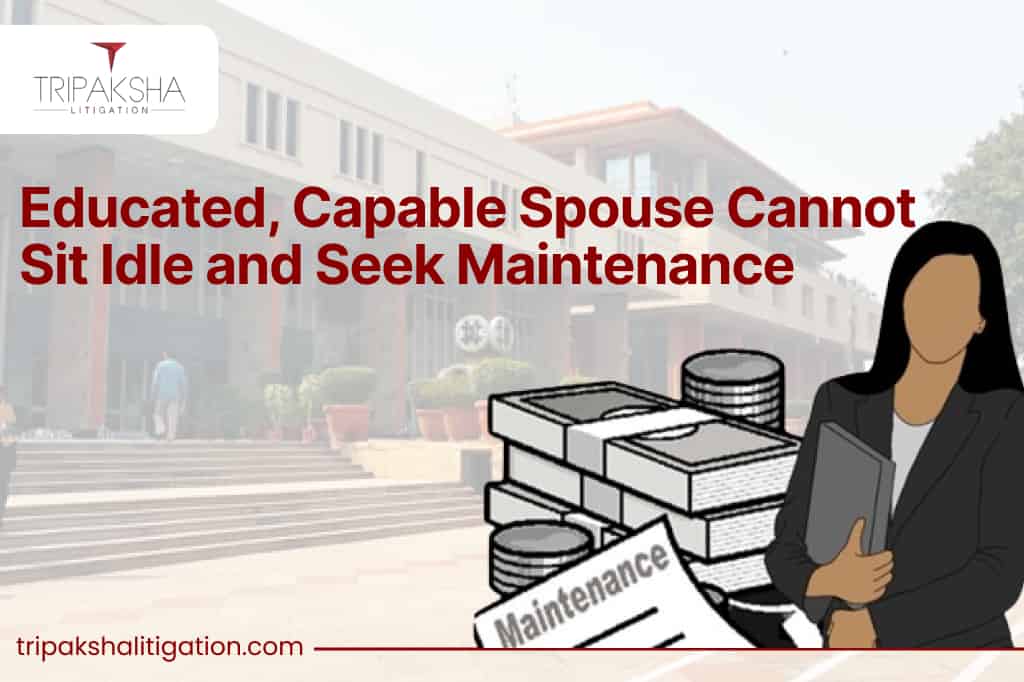Introduction
Maintenance under the law is defined as an amount of money paid to a dependent person such as a wife, child or parent so that they can support themselves financially. That the provisions of maintenance during the pendency of proceedings under the Hindu Marriage Act (HMA) is gender neutral, which clearly means that a husband or a wife can seek maintenance under the Act if they are unable to maintain themself
Recently, the High Court of Delhi, passed a remarkable judgment wherein it observed that a spouse having a reasonable capacity to earn but opts. to remain unemployed without sufficient reason. It clarified that such a spouse should not be encouraged to burden the other spouse with expenses and claim of maintenance.
Scope of Section 24 HMA
The object of Section 24 of the HMA is to make sure that during the matrimonial proceedings neither the wife nor the husband should remain handicapped and suffer any financial disability to litigate due to paucity of source of income.
In K.N. v. R.G., 2019 SCC OnLine Del 7704 the Court held that the proceedings u/s 24 of the HMA does not intend to equalize the income of both the spouses. The object of Section 24 of the HMA is to ensure that during the matrimonial proceedings, either party should not be handicapped and suffer any financial disability to litigate only because of paucity of source of income. The proceedings under section 24 of the Act are not intended to equalize the income of both the spouses rather it has an objective to ensure that either spouse is able to sail through litigation expenses and live a comfortable life.
Chetram Mali v. Karishma Saini, CM. APPL. Nos. 34480 & 34482/2023: Case Analysis
Brief facts of the case
The brief background of the case is that an appeal was filed by the husband before the High Court of Delhi, wherein he had challenged an order of the Family Court that directed him to pay Rs. 30,000 per month to his wife during the pendency of divorce proceedings.
On behalf of the husband, the Counsel contended that he was directed to pay Rs. 21,000 to his wife under Protection of Women from Domestic Violence Act and the said amount of maintenance was enhanced to Rs. 30,000 in the HMA proceedings.
Pointing out that the husband has a low income submitted that his wife was a graduate from Delhi University and she was earlier earning Rs. 25,000 while she was working as a receptionist at a hospital. It was added that the husband had many dependants comprising of his sisters, brother and aged parents. He also had to repay the loan that he took for his brother’s marriage.
The wife’s counsel averred that she was merely working as a social worker and not receiving any salary from the hospital.
Observations of Delhi High Court
The Court analysed the material on record, considered the contentions of both the parties, found that the husband’s salary after deductions and recoveries was only Rs. 56,492. It was noted that the Family Court had not given any reasons for enhancing the maintenance payable by the husband to his wife.
The High Court also took into consideration the duties of the husband towards the dependants as mentioned by him during the arguments.
Regarding the earning capability of the wife, the Court noted her educational background that she has studied from Delhi University but “appears to have voluntarily undertaken social work as claimed despite there being no impediment for undertaking a meaningful employment.”
Decision of High Court
The Division Bench of the Delhi High Court comprising of Justices V Kameswar Rao and Anoop Kumar Mendiratta reduced the maintenance to the wife that was granted by a Family Court during the course of pendency of divorce proceedings filed by the husband.
The Court stated that “The spouse having a reasonable capacity of earning but who chooses to remain unemployed and idle without any sufficient explanation or indicating sincere efforts to gain employment should not be permitted to saddle the other party with one sided responsibility of meeting out the expenses”.
It was clarified by the High Court that the amount of maintenance when decided by the Court cannot be determined through “mathematical precision”. The objective of granting maintenance is to provide relief to the spouse being unable to maintain during the pendency of proceedings.
The Court highlighted that the provision pertaining to maintenance during the pendency of proceedings under the Hindu Marriage Act (HMA) is gender-neutral and not gender biased. Section(s) 24 and 25 of the HMA deals with the rights, liabilities and obligations arising from the marriage between the parties under the Act.
After considering the facts in hand and arguments of the parties, the Hon’ble High Court reduced the interim maintenance from Rs. 30,000 to Rs. 21,000. It further added that the amount of maintenance will automatically get enhanced by Rs. 1,500 per month during each succeeding year, considering the inflation and rising prices.
Conclusion
The High Court in its remarkable decision has pointed out that if a wife is educated and capable then she cannot sit idle and claim maintenance from her husband without any reasonable ground.
The Court while taking into consideration the liabilities of husband towards his dependants and his monthly salary reduced the amount of maintenance that was granted by the Family Court.
This is indeed a welcoming move of the High Court where the Court took a balanced stand considering the facts in hand specifically pointing out that a spouse cannot be burdened to pay high maintenance to an idle wife who is unwilling to work and earn though is well qualified and capable.








